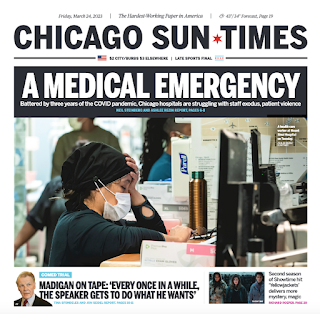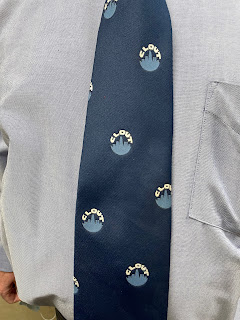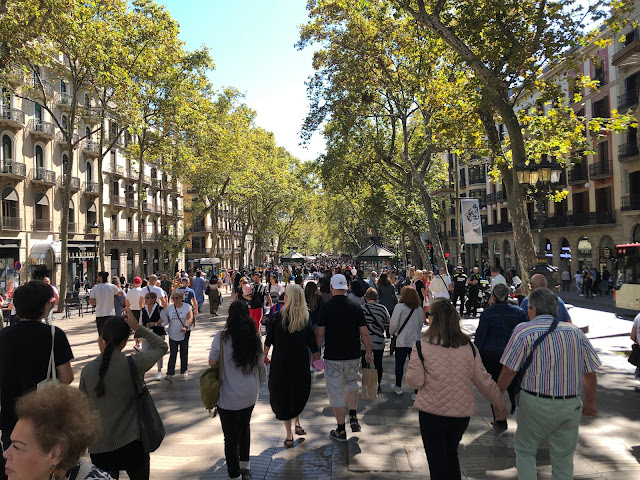This stratagem of inviting writer pals to pinch hit Saturdays seems to be working. Part of the fun is seeing what guests do with the opportunity. Always fun and surprising. Novelist Frank Sennett continues that streak today writing about his new thriller (you might recall my column singing its praises last month). I don't think I've ever seen anything written about book launch parties, never mind done so myself, so I enjoyed his perspective (and for the record, he got a good deal from Audible. I think they paid me $1500 for the rights to "Drunkard" for seven years. Which isn't good, but not bad for no extra work and, besides, now that the seven years have passed I'm actually getting royalties).
Enough preface. Take it away, Frank:
That was the trite though heartfelt thought I expressed to Neil or one of the media luminaries attending his recent book launch at R.J. Grunts. There were servers with trays of miniature milkshakes and savory treats. There was Neil, seeming to relish the moment, chatting briefly with first one guest then another before stopping at a table to inscribe a copy for the latest purchaser. It was beautiful.
Robert Feder had thrown a similar shindig for me at Petterino's when my Groupon book came out in 2012, an incredible act of kindness and friendship for which I'll always feel both grateful and undeserving.
Speaking of that book, last year I received an email from the literary agency that sold it to St. Martin's Press and Audible.
"I’m pleased to share with you a renewal offer for the audio edition of GROUPON’S BIGGEST DEAL EVER from Audible," the email began, promisingly.
"This is the best offer that we were able to negotiate, and we recommend that you accept the terms of the renewal."
That best offer? Forgiveness of my "$2397 unearned advance."
Drinks are on me, I thought as I accepted the renewal. It had not occurred to me that Jeff Bezos might one day send a drone to my door to obtain a partial refund on the bad deal he'd made for my book more than a decade ago. I was relieved to know I would avoid that unpleasant eventuality in exchange for this minor humiliation.
Some writers dwell on these types of disheartening publishing stories. We all have them. These days, they make me laugh. Mostly.
A better payoff from my Groupon book experience came thanks to the wonderful editor on the project. He left St. Martin's to start a mystery imprint called Crooked Lane Books, and he told a mutual friend several years ago that if I ever wrote a mystery again, he'd like to see it. (I had published two books in a series about a crime-solving Chicago newspaper reporter with the tiny adult fiction imprint of a giant nonfiction publisher in 2003 and 2004. I wrote them as my creative writing MFA thesis circa 1993 and the manuscripts were literally sitting in my desk drawer when an editor who'd seen some of my magazine feature work called to inquire, "Do you have any novels in your desk drawer?" Why, yes, I replied. I thought you'd never ask.)
In late 2021, I nailed down a polished draft of a new thriller involving a plot to kill the president, re-creations of infamous assassinations and the infiltration of white supremacist Proud Boys into law enforcement. I contacted my Groupon collaborator. Just as he'd promised our friend, he asked to read the manuscript and soon made an offer, which I gladly accepted. I was assigned to another wonderful project editor, Terri Bischoff, and the marketing team got busy brainstorming a more marketable name to replace my working title, The Secret Assassin. A consensus formed around Shadow State. The novel, first in a planned series featuring former Army Ranger and Secret Service agent Rafe Hendrix, came out in hardcover, e-book and audio Feb. 21.
Time for a launch party! I knew I wouldn't top Neil's, but he gave me a target to shoot for. I reached out to my friends the Nardini brothers who run Club Lago, the classic Italian joint in River North. We penciled in Monday, Feb. 27 for the big event. Miraculously, more than 100 folks showed up over the course of two and a half hours that evening, including the proprietor of this blog, who recently gave me what will probably remain the best review of my writing career.
The cadence of the event took me by surprise. At 5:30 p.m., a couple of well-wishers came in and purchased the book. I sat down at the sales table and signed as I chatted. A man who had seen the media coverage mentioning my Montana roots stopped in to buy a copy and ask if by any chance I had ever heard of the name Tom Judge, who was his college roommate at Notre Dame. In fact, I replied, when Judge served as Montana governor, my late father was his assistant, the youngest person in the nation to hold that title at the time. As Steven Wright says, it's a small world, but I wouldn't want to paint it.
After that, the evening became a blur of friendly folks handing me books to inscribe as I stood rooted in one spot for more than two hours. I noticed a couple of friends across the room who ended up leaving before I could say hello because the line was so long. When the room thinned out around 8 pm, I almost fell backwards into the chair. My legs were locked up from standing in one position for so long. I didn't notice the ache until the end.
It was my "It's a Wonderful Life" moment. Among the guests were friends, acquaintances and colleagues from high school, college and every job I've worked in Chicago, including four former bosses as well as the three partners who run the marketing firm I work at now. And throughout, I met friendly strangers who'd read Neil's review or heard me on Rick Kogan's After Hours show on WGN-AM the day before.
During a commercial break, Rick took off his headphones and told me he sold 700 books during the 2001 publication party at the House of Blues for Everybody Pays, which he wrote with Maurice Possley,
Thanks to Neil and several of you, Stephanie Kitchen and her crew at City Lit Books sold 75 copies of Shadow State at Club Lago. So ok, I'm no Kogan or Possley or Steinberg. But that launch party made me feel like (Stephen) King for a day.












